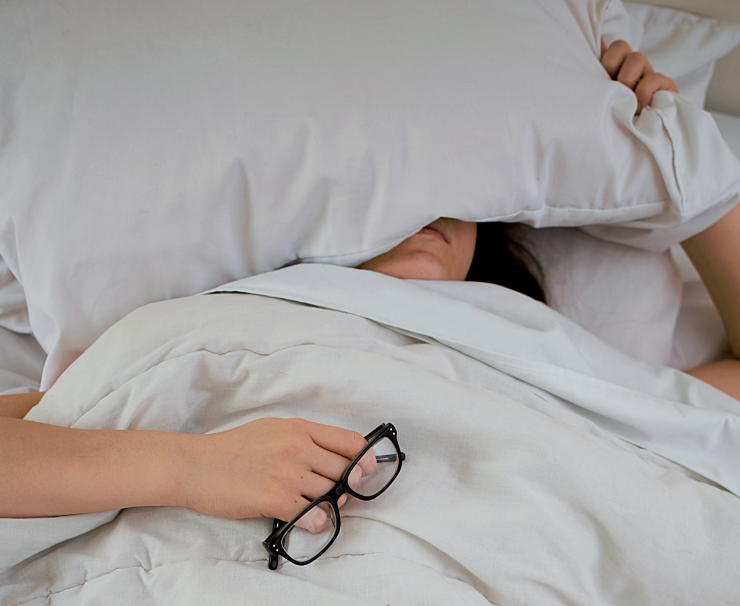Non-Hospitalized COVID-19 Linked to Developing Insomnia
A new study found non-hospitalized COVID-19 survivors from a Vietnam general population had a 76.1% prevalence of insomnia, with 22.8% of respondents with insomnia scoring for severe insomnia.
Credit: Unsplash

Non-hospitalized COVID-19 survivors have a high prevalence of insomnia, according to a new study.1
“Results from the study indicated that more than 75% of participants had insomnia, which is remarkably higher than previously reported among general population (10–20%),” wrote investigators, led by Huong Thi Xuan Hoang, PhD, from the faculty of nursing at Phenikkaa University in Hanoi, Vietnam. “This proportion is also much higher than the prevalence of insomnia among hospitalized COVID-19 survivors presented in previous systematic reviews.”
Hoang and Colleagues wrote this could have been attributed to the fact participants had COVID-19 within 6 months of completing the survey, so that could have explained why insomnia was more prevalent.
The global pandemic may be over, but people continue to get infected by COVID-19. Even though with the vaccine the virus is less serious with 90% of COVID-19 cases recovering from the virus in mid-2023, the illness can still leave people with lingering symptoms—fatigue, persistent cough, muscle aches, and sleep problems, among others. This is known as long COVID, experienced by approximately 40% of individuals who had COVID-19.2
A couple of recent systematic reviews found the prevalence of insomnia among COVID-19 survivor patients had a prevalence ranging from 5.4 – 66.67%.1 Research found risk factors for insomnia among COVID-19 survivors included being female, younger age, higher employment, and education status. Although insomnia was a common symptom after a COVID-19 infection, only hospitalized COVID-19 patients were studied.
To see if insomnia was present among non-hospitalized COVID-19 survivors, as well as to identify the link between COVID-19 survivors and the psychiatric disorders of depression and anxiety, investigators conducted a cross-sectional online survey of 1056 COVID-19 survivors in the Vietnam general population who did not need hospitalization. The survey was open from June – September 2022 and was sent to all the members of the COVID-19 patients’ network.
Participants, aged ≥ 18 years, completed the survey within 6 months of their first COVID-19 infection. Investigators excluded participants if they had a history of insomnia and any psychiatric disorder before their COVID-19 infection.
Participants self-reported age, sex, marital status, employment status, education level, occupation, and pre-existing conditions. They also hate to rate the severity of their COVID-19 infection, stating whether it was asymptomatic or symptomatic, and the number of days infected. Most of the participants were female (68.5%), had a mean age of 33.6 ± 10.1, married (64%), had a university education (68.5%), were healthcare workers (20.1%), students (16.1%), not working (3.4), and had pre-existing chronic conditions (11.7%).
Many of the participants (92%) were symptomatic when they had COVID-19. Participants with symptomatic symptoms had COVID-19 for a mean of 11.2 ± 4.3 weeks).
Using the Vietnamese version of the Insomnia Severity Index, the team found respondents had a 76.1% prevalence of insomnia, with 22.8% of them scoring for severe insomnia. Moreover, a third of participants reported worse sleep quality, shorter sleep duration, and harder to fall asleep. Half of the respondents reported staying awake at night more after their COVID-19 infection.
Symptomatic participants scored higher on the Insomnia Severity Index than asymptomatic participants (15.2 ± 6.1), although the team found no statistical significance.
Additionally, in univariate regression, participants who were married (odds ratio [OR], 0.68; 95% CI, 0.49 – 0.91, P < 0.05) and had a university education (OR, 1.62; 95% CI, 1.07 – 2.45, P < 0.05 had significantly lower odds of having insomnia than participants who were single or had a formal education. In contrast, students rather than healthcare workers (OR, 1.77; 95% CI, 1.10 – 2.85, P < 0.05) and participants with pre-existing chronic conditions (OR, 3.58; 95% CI, 1.90 –6.77, P < 0.001 had a significantly greater odds of having insomnia after their COVID-19 infection. In the multivariable regression, participants with chronic conditions had a 2.96 greater odds of having insomnia (95% CI, 1.50 – 5.84).
To identify psychiatric disorders, the team used the Depression Anxiety and Stress Scale-14. They used a multivariable logistic regression to evaluate the links between insomnia levels and the depressive and anxiety score.
Ultimately, 27.6% of respondents had depressive symptoms, and 41.6% of respondents had anxiety symptoms. Participants with depressive (odds ratio [OR], 3.45; 95% CI, 1.87 – 6.34) or anxiety (OR, 3.93; 95% CI, 2.52 – 6.13) symptoms had significantly greater odds of developing insomnia. The team noted other risk factors for insomnia were pre-existing chronic conditions and higher education levels. COVID-19 symptoms and duration were not significantly linked to insomnia.
“This study confirmed anxiety and depression were [significantly] associated with insomnia among recovered COVID-19 patients, which is in line with previous studies,” investigators wrote. “As COVID-19 infected patients were at higher risk of developing mental health problems, the psychological burden of being infected and quarantine would much likely to negatively impact their sleep quality even after their infection.”
Investigators outlined multiple limitations, such as the study being cross-sectional so no direct causations could be made, online collecting data and the sampling method could have caused recalled bias and selection bias, and not measuring some sleep parameters, vaccination status, and physical symptoms of COVID-19.
“Our findings add to current literature on insomnia after COVID-19 infection and underscores the crucial need to implement comprehensive interventions to address the psychological and sleep health of COVID-19 patients after recovery,” investigators wrote.
References
- Hoang, H, Yeung, W, Truong, Q, et al. Sleep Quality Among Non-Hospitalized COVID-19 Survivors: A National Cross-Sectional Study. Frontiers. 2024; 11. https://doi.org/10.3389/fpubh.2023.1281012
- Derman, C. Short Sleepers with Pre-Existing Medical Conditions at Higher Risk of Long COVID. HCPLive. January 12, 2024. https://www.hcplive.com/view/short-sleepers-pre-existing-medical-conditions-higher-risk-long-covid. Accessed February 16, 2024.